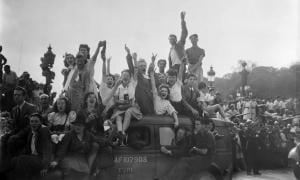As I write this it was seventy-five years and two days ago that Paris was liberated from Nazi occupation.
I noted this anniversary on my Facebook page along with a link to a contemporary newsreel.
A friend mentioned as a comment that if we had Amazon Prime, we might want to watch the 1966 movie Is Paris Burning. My answer was, I hope, in only a mildly smug note, that to the degree it relied upon the memoirs of General Dietrich von Choltitz, his motives for not blowing up the city may have been less his humanism and belief that Paris was a world culture treasure and more that he knew the war was all but over and he would have to face consequences.
However, as it happens the only television service we have beyond basic cable is Amazon Prime. And, last night Jan and I watched it.
Oh my.
The script was written by Gore Vidal and Francis Ford Coppola, scored by Maurice Jarre, and directed by Rene Clement. The ensemble cast includes Orson Welles, Anthony Perkins, Kirk Douglas, Gert Frobe, Jean-Paul Belmondo, Glenn Ford, Robert Stack, and Alain Delon, among many others. It’s based on a novel by Larry Collins & Dominique Lapierre, which was published the year prior.
Lots of knocks against the movie. Women are basically errand runners and telephone operators. If I counted it right, three scenes with African faces and only one person with a spoken line. Fractionally less than three hours it moves slowly. I gather Mad Magazine parodied it under the title “Is Paris Boring.”
Apparently it’s somewhat notable for a mashup of Hollywood and European film making. The directing is pretty straightforward and old fashioned. It sometimes had the feel of a documentary, and did indeed include archival footage. I had mixed feelings about the music. It was big. It intruded into my consciousness a number of times. Which I believe musical scores are not supposed to do. But, and, whatever the right word here is, well the right word is: it worked.
The whole thing was moving.
With the range of cast its interesting that there are very few actual full own villains, and while there are a lot of Germans, the only unvarnished evil are all Gestapo. Although lots of evil by complicity. A raft of that. Kind of like times I’ve known.
What surprised me most is how both subtly and not so, it is at heart profoundly anti-war. It wasn’t saying that sometimes war is unavoidable. This sure seemed to be an example of just war. But whether just or not, totally hellish, unavoidably evil.
When one of the characters is introduced and we get references to his family, I knew he would die. And he does. Then it happened again. And again. And it happened with French, with Americans, and with Germans. People neither particularly good, nor particularly bad as people, just died. And never particularly nobly, leading a charge. Just killed.
But ultimately, it was about what might be worth those costs. And that “worth” was captured as a city. Itself rich and nuanced, filled with small and larger contradictions. Us. Humans. Who doing our lives along the way on occasion make decisions that, well, are beautiful. The create. That are joyful. That justify us.
These days I’ve found the idea of duty rolling around in my heart. Duty is something that isn’t much on our minds these days. But, it is on mine.
And, I think this film speaks to what that word duty might be about.
Not sure, not sure at all. Just thoughts, just feelings.
But, worth sitting with. I feel…













